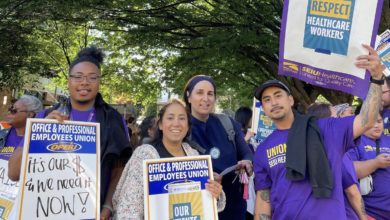The writer is an activist in South Dakota.
On Nov. 7, South Dakota voters overturned a state law that had banned nearly all abortions.
In March, Gov. Mike Rounds signed a law that prohibited abortions at all stages of pregnancy and offered no exceptions
 |
The issue of abortion has been used by the Bush administration and its followers in Congress and state legislatures to whip up bigotry among their right-wing religious base. The legalization of a woman’s right to choose—won as the result of years of struggle—is in danger.
The South Dakota law was an integral part of this campaign. The anti-abortion capitalist politicians were using it as a test case in their continuing attempts to undermine the 1973 Roe v. Wade Supreme Court decision that legalized abortion. It was the most extreme version of anti-abortion legislation that has been pushed and passed in other states. All of these laws have the same goal—eroding a woman’s right to control her body.
The South Dakota measure was to take effect in July, but a petition drive by abortion-rights groups forced the issue onto the ballot and delayed its implementation pending a voter referendum on the issue.
If the law had been implemented, it would have been a step backward for women’s and workers’ rights and further opened the door to attacks on reproductive rights.
In the wake of the law’s defeat, anti-abortion state legislators are split on whether to accept the will of the voters or to try to implement an abortion ban with some exceptions.
Republican senator Jason Gant said that the state voiced their opinion and “we need to just go with that.” But state representative Roger Hunt, who introduced the bill banning abortions, vowed to restart discussion of an abortion ban in January 2007. (Sioux Falls Argus Leader, Nov. 9.
Hunt also said that lawmakers could introduce bills that continue to chip away at the availability of the procedure. One possible bill would require a pregnant woman to view a fetal ultrasound before the abortion procedure takes place.
Women’s reproductive rights are already severely restricted in South Dakota. There is only one clinic in the state that provides abortions and only on one day per week. The single clinic is at the extreme eastern part of the state. All women who seek abortions must go through a 24-hour waiting period and endure mandatory counseling.
Progressive groups and reproductive rights organizations were jubilant with the results. “It is a very important victory for people who are open-minded and progressive in this country,” said Sarah Stoesz, chief of Planned Parenthood’s operations in the Dakotas and Minnesota. (Reuters, Nov. 8)
Over $2 million was poured into the ballot issue on both sides. It became a national flashpoint for both women’s rights advocates and reactionary, anti-abortion activists.
Grassroots organizing helped stop the legislation. More than 2,000 volunteers throughout the state stood on street corners, knocked on doors, and helped to reenergize the pro-choice movement in South Dakota in the months before the vote.
Reproductive rights need to be seen by revolutionaries and progressives as part of the overall struggle for working women.





